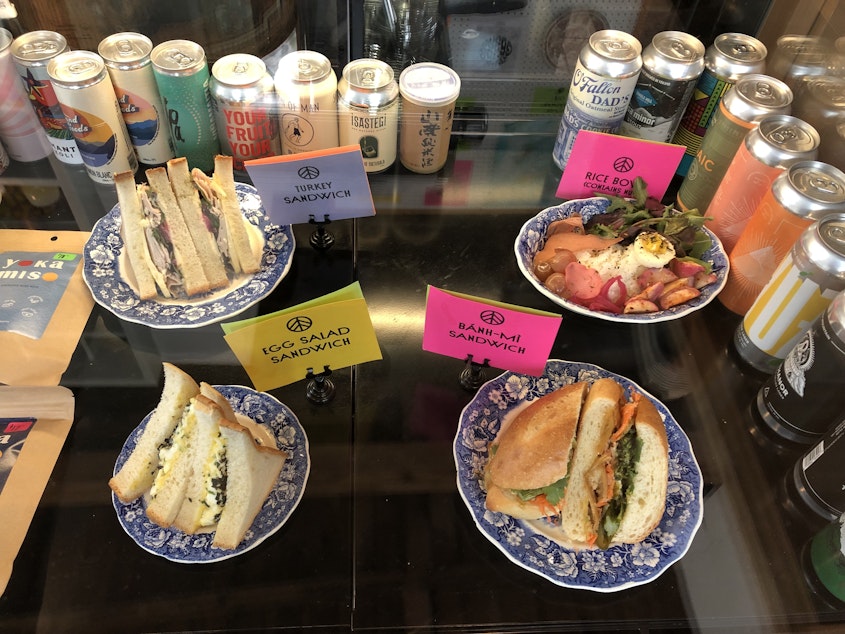The brave Seattle foodies who opened restaurants during Covid — and flourished

Many Seattle restaurants, including beloved icons like Beth’s Café, Dahlia Lounge, and Tup Tim Thai, shuttered during the pandemic. But that hasn’t stopped many more from opening.
Meet two restaurant owners who chose to launch new businesses despite uncertain times.
The restaurant business is not for the faint of heart. It’s hard work with slim profit margins. Yet, it draws people like Yasuaki Saito. His latest venture is St. Bread on Portage Bay near the University of Washington. It opened last April.
“Some people say it might be foolish,” said Saito, with a laugh.
St. Bread is housed in a former boatyard and features Japanese and Danish inspired pastries and sandwiches. Plans for the café were in the works even before the pandemic. Saito said they decided to move forward anyway.
“When you’re a small business owner, you have to be a bit fearless in certain ways," he said. "You also have to have a huge amount of belief, there’s got to be something you really believe is going to resonate with others.”
Saito has been in this line of work for more than 15 years. He’s co-owner of London Plane in Seattle’s Pioneer Square, and Post Alley Pizza on Harbor Steps. He says the pandemic has added a layer of challenges. This includes keeping staff and guests safe from Covid. Like many businesses, the shop has a covered outdoor seating area, which has helped. But sometimes all the precautions can’t prepare you for the pandemic’s twists and turns.
“We’ve definitely seen a big drop off starting with the omicron surge at the end of the year and then through this first part of the year,” said Saito.
Rising food costs and labor shortage make survival even harder. To date, more than 3,300 restaurants in Washington have permanently closed since the pandemic. The Washington Hospitality Association, a trade group representing restaurants and hotels, fears that more will follow without federal intervention. That’s because many that are still afloat are carrying big debts, an average of $160,000.
Saito said in a way, the pandemic has revealed hard issues facing the industry. It’s sparking conversations in public, and making some customers realize the quandaries businesses face.
“People are like, ‘Man, that’s a $9 sandwich, it’s so expensive,'" Saito said. "Well, it actually, probably could’ve been or should’ve been $11 sandwiches.
"But we’re trying to keep it under double digits so that we can make it more accessible to people."
In Seattle’s Ravenna neighborhood, Chef-owner Preeti Agarwal tastes the dal and lamb dishes before the restaurant opens. Kricket Club, focused on modern Indian cuisine, is her second pandemic venture. At the start of the pandemic, she launched Meesha in Fremont. She says in a way, the pandemic created an appetite for new food places.
“I think people were bored sitting at home for so long,” she said.
Agarwal says they were going to take it slow initially. They opened at 50% capacity to give her staff time to become familiar with the menu and operation.
“We were so overwhelmed by the response, and we were very excited," said Agarwal. "At the same time, we were not prepared to serve so many people.”
Winter months in general tend to be slow. Before the pandemic, restaurants worried about having enough diners. Now, in addition to volume, they’re making sure staff are safe both at work and beyond.
“Protect yourself as much as you can, always wear a mask," Agarwal said she tells her staff. "Making sure you don’t meet a lot of outside people, going to places, staying indoors with like 100 or 200 people."
Agarwal said the pandemic has made small businesses get creative. As the pandemic drags on, everyone’s tired. But she and Yausaki Saito of St. Bread try to focus on the positive.
“I feel it more that I’m doing this for the community and making people happy,” said Agarwal. “Everywhere, wherever I go, people say this to me, thanks for opening this and introducing us to this amazing cuisine.”




